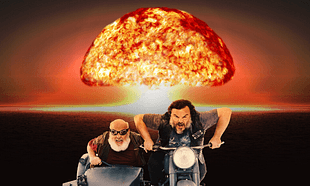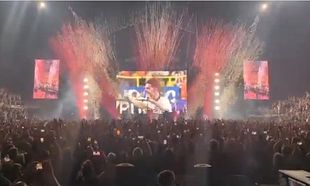Having reportedly spent almost $300million on the belated sequel to their groundbreaking 1982 science fiction movie, Tron Legacy is easily Disney's biggest film of the year. No less grand in scale, its soundtrack was a massive undertaking for French electronic musicians Guy-Manuel de Homem-Christo and Thomas Bangalter, one that has had Daft Punk die-hards and sci-fi fanboys alike chomping at the bit. A colossal torrent of orchestral might and electronic invention, the duo has lived up to the challenge, and then some.
Beginning with an 'Overture', later reducing the pace with 'Adagio for Tron' and an appropriately dark 'Nocturne' and eventually closing with 'Finale', Daft Punk are conspicuously aware of the classical conventions that inform much soundtrack work. Recorded with an 85 piece orchestra, the result is epic, yet manages to incorporate not only the duo's own telltale bending synths but also 80s style electronics, cleverly hinting at the film's origins. It's perfect for science fiction too, with the more dated sounds reminiscent of the soundtrack for Terminator while the throbbing bass and violent strings easily live up to the huge modern scores for the likes of The Matrix or the newer Star Wars movies.
Though 22 tracks in length, each are short and easily digestible, built as they are around a limited number of repeated motifs. The most striking of these is a simple yet powerful descending sequence, central to the thunderous cacophony of 'The Game Has Changed'. Percussion is key, as repeated rhythm patterns are battered out by mammoth drums, punctuating the likes of 'Rinzler' as it swirls and rises towards its seething climax. The suspense is often overwhelming, particularly when shrill violin trills evoke a sense of impending terror on the ominous 'Rectifier'. Yet, this record's softer moments can be equally potent, the aforementioned 'Adagio...' swaying back and forth between the macabre and the sublime.
Strangely, their electronic home territory is the least energizing here, yet Daft Punk have succeeded in composing a score that will work wonderfully on screen while still making for thrilling listening in its own right.








































































